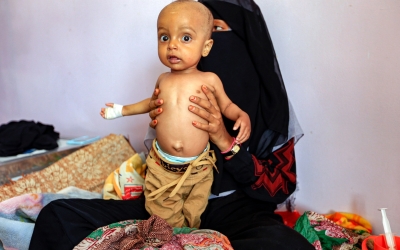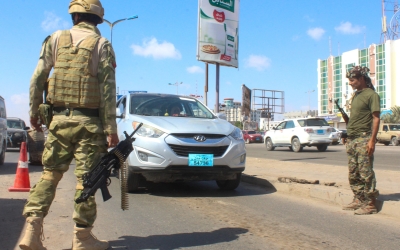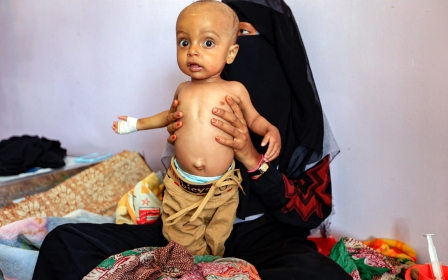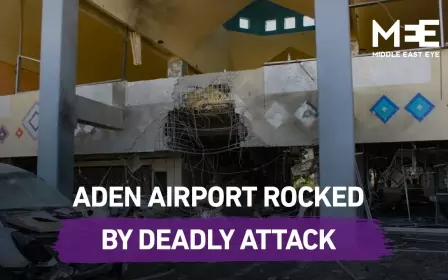Yemen: UN condemnation of Houthi terror designation sparks campaign against envoy
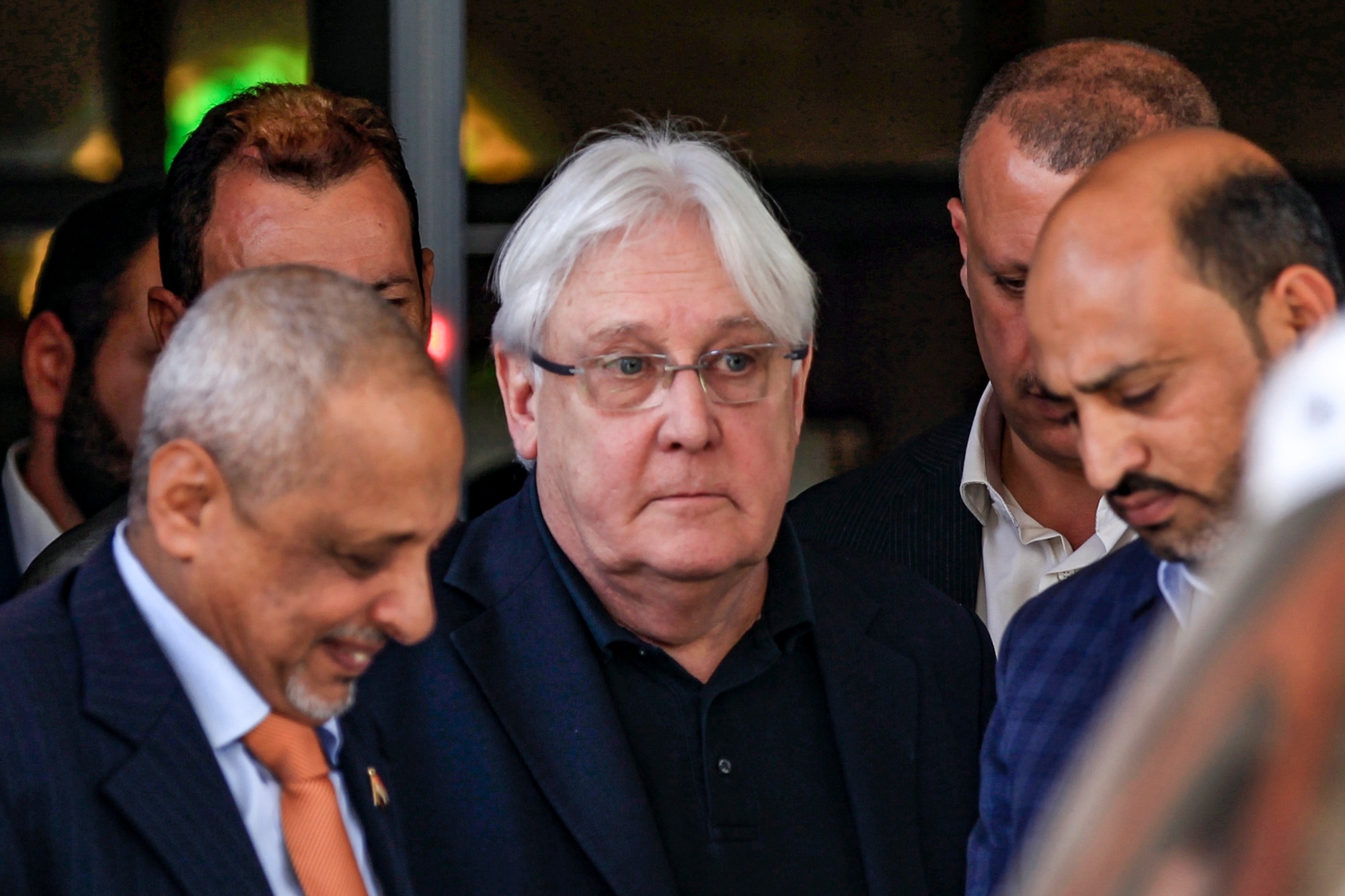
The reaction of Martin Griffiths, the United Nations special envoy for Yemen, to US plans to designate Yemen's Houthi movement as a foreign terrorist organisation has created a campaign against Griffiths by pro-government figures.
Mark Lowcock, director-general of the United Nations Office for the Coordination of Humanitarian Affairs (OCHA), called for the decision by US President Donald Trump's government to be reversed, warning that ensuing sanctions could lead to the cost of food increasing by as much as 400 percent in the already poverty-stricken country.
New MEE newsletter: Jerusalem Dispatch
Sign up to get the latest insights and analysis on Israel-Palestine, alongside Turkey Unpacked and other MEE newsletters
Griffiths and World Food Programme executive director David Beasley echoed Lowcock's call on 14 January, urging Washington to reverse the decision immediately.
Rights groups and aid agencies have also warned against the US plan to designate the Houthis as a terrorist group, insisting that the designation will accelerate Yemen's slide into a large-scale famine.
However, the denunciation of the US move has created anger among supporters of exiled Yemeni President Abd Rabbuh Mansour Hadi, as pro-government activists, journalists and politicians have zeroed in on Griffiths and accused him of serving the Houthi rebels, who have been fighting pro-government forces since 2014.
A social media campaign under the Arabic hashtag "Martin Griffiths supports terrorism" has spread widely in Arabic, while some cartoonists have drawn caricatures to express anger against the UN envoy.
But some have rejected the campaign against Griffiths, pointing out the alleged war crimes by Hadi's own allies, as others highlighted that humanitarian considerations ought to take precedence over political point-scoring.
Accusations of complicity
Saleh Nabil was one of those angered upon hearing that Griffiths opposed the designation Houthis as a terrorist organisation, citing allegations of crimes committed by Houthis in his governorate Taiz.
"There are daily attacks and crimes by the Houthis around the whole country nowadays, especially in Taiz, but Griffiths doesn't consider such attacks to be terrorism!" the Yemeni man told Middle East Eye. "I don't know what terrorism means for the UN. If the UN envoy doesn't consider killing civilians for six years to be terrorism, that means we can't reach a solution in Yemen at all."
Nabil noted the attack on Aden airport in December 2020 shortly after a plane carrying a newly formed Yemeni government arrived from Saudi Arabia, which the government has accused Houthi fighters of committing, an allegation the group has rejected.
Griffiths has condemned the "ruthless attack" on the Aden airport, calling the scale of damage caused by the missile strike "extraordinary".
Nabil hypothesised that strategic thinking may be behind the UN's decision to oppose the terrorism designation.
"Griffiths isn't stupid enough to believe that attacks on civilians aren't terrorism, but he knows that the Yemeni government can't say no to the UN, while the Houthis may stop dealing with him if he said the truth," Nabil said.
The internationally recognised government (IRG) of Yemen has not officially commented on the UN reaction to the US designation plan, but Minister of Endowments Mohammed Shabibah accused Griffiths in a tweet of working in the interest of the Houthis.
Shabibah has not been the only one to imply Griffiths was complicit in some ways with the Houthis for nefarious purposes.
The Yemeni politician and Unesco representative Mohammed Jumeh meanwhile tweeted: "Griffiths failed in his role because of the Houthis' rejection of peace, failed on briefing the UN Security Council about that and refused designating the Houthis as a terrorist group.
"Nevertheless, he holds on to his position. It isn't for the sake of achieving his tasks but for other purposes."
The Hadi government has been pushing for Houthis to be designated as a terrorist group for years and it welcomed the US move.
Osama al-Qadhi is a pro-Hadi fighter who has been fighting the Houthis for years on different fronts in Yemen.
"We are fighting on the battlefields, but the Houthis have been targeting civilians in their homes and civil institutions, and that's definitely terrorism," he told MEE. "Today, [Griffiths] revealed his other face, and all Yemenis know that he supports the Houthi terrorists to kill more civilians."
Qadhi said he hoped the Hadi government would call for Griffiths' resignation.
"We shouldn't wait for a solution to come from the UN, and our government should start to look for the solution itself and it will find fighters to support its decisions on the ground. A solution won't come from abroad."
Accusations of double standards
But in the country where war has raged for around six years, not all agreed with the campaign against Griffiths.
Mujahed, a trader who requested not to have his surname used, told MEE that he was happy to hear that the UN was calling for the reversal of the designation, calling it a dangerous step by the US that would have devastating consequences on Yemenis.
"Regardless of the humanitarian impact of this step by Trump's administration, there is no solid evidence to consider Ansar Allah as a terrorist group," he said, using another term for the Houthi rebels.
Mujahed claimed US accusations that Houthis were behind the December airport attack was false, while pointing to attacks by the Saudi-led international military coalition that has backed Hadi since March 2015.
"The USA didn't mention attacks by the Saudi coalition on wedding halls, homes and other civil institutions," he noted, arguing that if Houthis were deemed terrorists, "the Saudi coalition should be also a terrorist group".
Mujahed moves between provinces because of his work, and said he has witnessed the suffering of Yemenis everywhere.
'I'm not with Ansar Allah nor with Hadi. I'm with the vulnerable people around Yemen'
- Ahmed, aid worker
"The Saudi air strikes killed and destroyed more than Ansar Allah, and if there are sanctions they should be on both sides," he said.
Ahmed, a humanitarian worker with an international organisation, spoke to MEE on condition of anonymity because he isn't authorised to speak to the media. He said he understood the point of view of the UN on the matter.
"The UN is thinking about the humanitarian consequences of such a step, and that's why the UN and other organisations are calling for the US plan to be revoked," he said. "There is a campaign against Griffiths, but in fact he didn't do anything wrong. What he did is only a good step to save the lives of millions in Yemen."
Ahmed stated that the humanitarian consequences of such a terror designation could be "disastrous".
"I'm not with Ansar Allah nor with Hadi. I'm with the vulnerable people around Yemen, and I'm only thinking about them and their future, so I hope we can continue to support them," he said.
Middle East Eye delivers independent and unrivalled coverage and analysis of the Middle East, North Africa and beyond. To learn more about republishing this content and the associated fees, please fill out this form. More about MEE can be found here.


